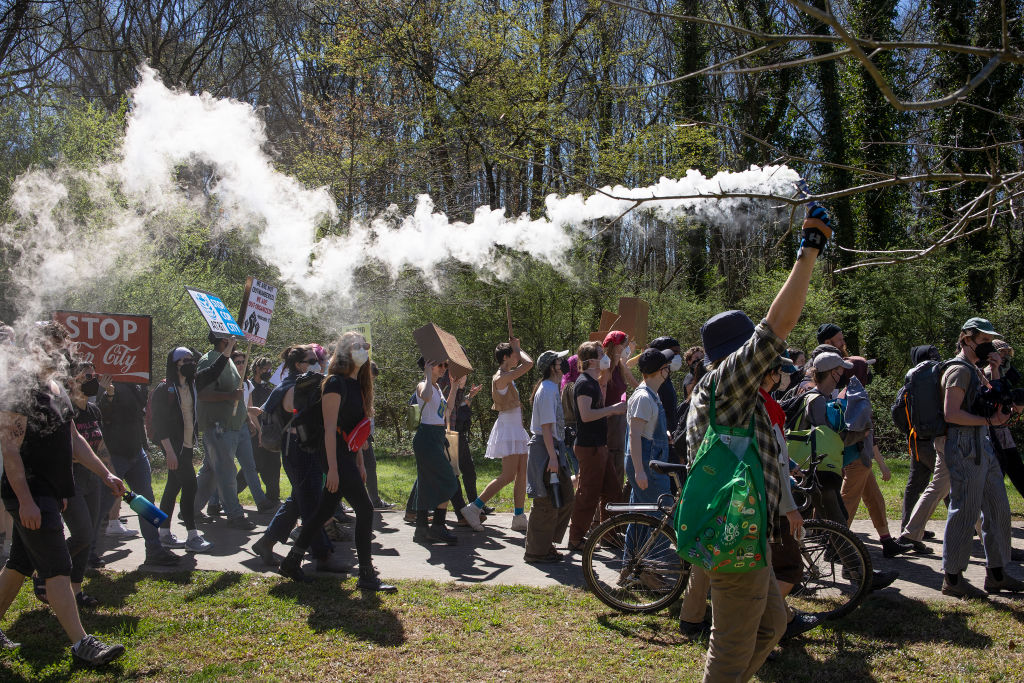Source: Andrew Lichtenstein / Getty
The Atlanta Public Safety Training Center, also known as Cop City, is an 85-acre police and firefighter training center in Atlanta. The facility was approved for funding in June 2023, but the massive center has sparked a polarizing debate among city officials, activists, and lawmakers. Located in DeKalb County, an area with a large African American population, protestors worry that the training ground will lead to more hostile policing in the area. Anti-Cop City activists say that the project is a waste of money and that construction could cause environmental damage. They believe that funding could be used for other pressing needs to better the lives of residents in the Peach City.
Lawmakers in favor of the facility believe that Cop City will reimagine law enforcement training and equip officers and firefighters will the tools and resources they need to protect and serve Atlanta’s diverse community.
What will Cop City do for the City of Atlanta?
Despite heavy opposition and pushback from city activists, Cop City, a $90 million project, was passed with an 11-4 City Council vote in June. Construction for the training center is currently in progress. It’s expected to be complete by quarter four of 2024, according to the facility’s website.
Situated near Constitution and Key Roads, Cop City holds historical significance as it was the site of the City’s previous law enforcement training center and served as the venue for APD’s tactical training for more than three decades.
The training center will feature an Emergency Vehicle Operations Course for imparting safe driving techniques to firefighters and police officers. It will also include a laboratory dedicated to the development and testing of technological innovations, a training fire station, a simulated streetscape to replicate real-world crisis scenarios faced by law enforcement officers, and a leadership institute where police and firefighters can extend their knowledge of law enforcement management.
Beyond the emphasis on tactical training, the Public Safety Training Center (PSTC) will prioritize cultural awareness and community knowledge training that will teach participants effective tools for policing a diverse city and key ways to build trust with community members.
Activists and lawmakers have been protesting against the facility.
Protests against the 85-acre training center have been going on for more than two years. As previously
reported, in November 2023, more than 400 demonstrators marched toward the Cop City construction site to protest. Some demonstrators whore masks, goggles, and chemical suits, anticipating the use of tear gas by police. When they arrived at the site, members of the DeKalb County Police Department and Georgia state troopers were standing guard. Law enforcement used tear gas and flash-bang grenades to stop protesters from reaching the area.
Demonstrators pushed back against the violent response, arguing that they had no intention of turning their peaceful demonstration into a violent showdown.
Protestors have gone on to face harsh punishment for voicing their opposition against Cop City. Some are facing racketeering charges. Others have been labeled “extremists” by the DHS for their involvement. In August, members of the ACLU, the NAACP, and various civil rights organizations pled for the DHS to change the way they investigate and classify individuals protesting the controversial training center.
Protestors have also voiced environmental concerns about the facility. In August, South River Watershed Alliance (SRWA), an environmental group, filed a lawsuit against the City of Atlanta and the Atlanta Police Foundation, alleging that both parties “began site clearing for the facility without installing the required sediment detention ponds.” SRWA members believe that the alleged misstep could cause harm to animals living in the area and major health issues for residents.
“Increased suspended sediment and sedimentation has detrimental effects on fish and macroinvertebrates, including avoidance of sedimented areas, reduced physiological function, reproductive impairment, and mortality,” the alliance argued, according to the lawsuit.
Opposers are trying to create a law that would stop Cop City.
On Feb. 5, Atlanta city leaders established a formal procedure for validating signatures on a petition opposing the contentious public safety training facility, Fox 5 Atlanta reported. Cop City critics submitted their petitions, containing tens of thousands of signatures in September with the hope of halting construction on the site.
When opposers arrived at the city clerk’s office with more than a dozen signatures, Atlanta officials asserted that they were legally prohibited from initiating the verification process. According to the report, officials cited that the organizers failed to meet an Aug. 21 deadline. While a federal judge had previously extended the deadline to September, an appellate court on Sept. 1 halted the enforcement of that order, plunging the initiative into legal uncertainty. Atlanta City Councilwoman Liliana Bakhtiari is pushing for the city to thoroughly review all of the collected signatures.
SEE ALSO:
‘Cop City’: Police Chief Blames Protesters After Cops Use Tear Gas To Disperse Crowd
Op-Ed: Atlanta’s ‘Cop City’ Is Undermining Democracy
The post Cop City: What We Know About Atlanta’s Controversial Police Training Center Project appeared first on NewsOne.
The post Cop City: What We Know About Atlanta’s Controversial Police Training Center Project appeared first on Black America Web.

